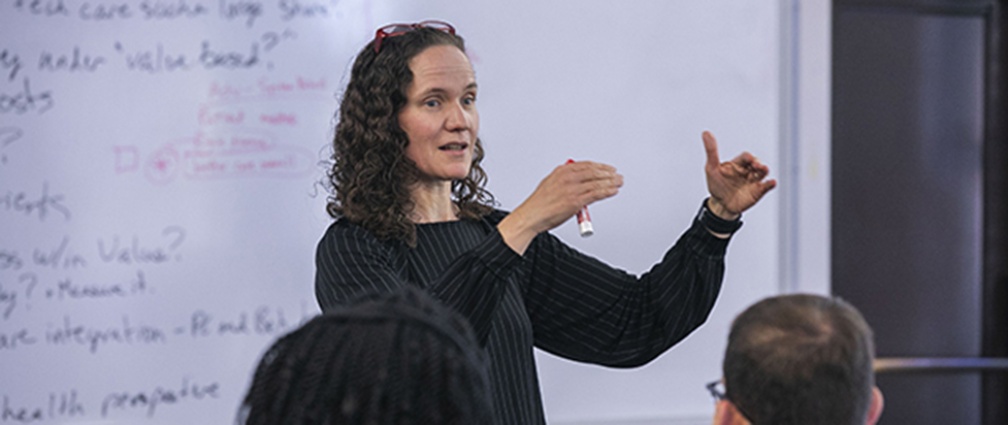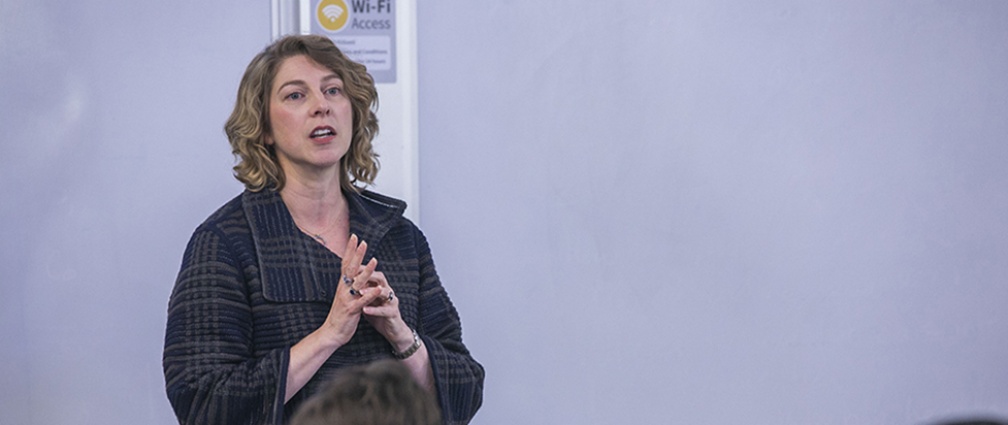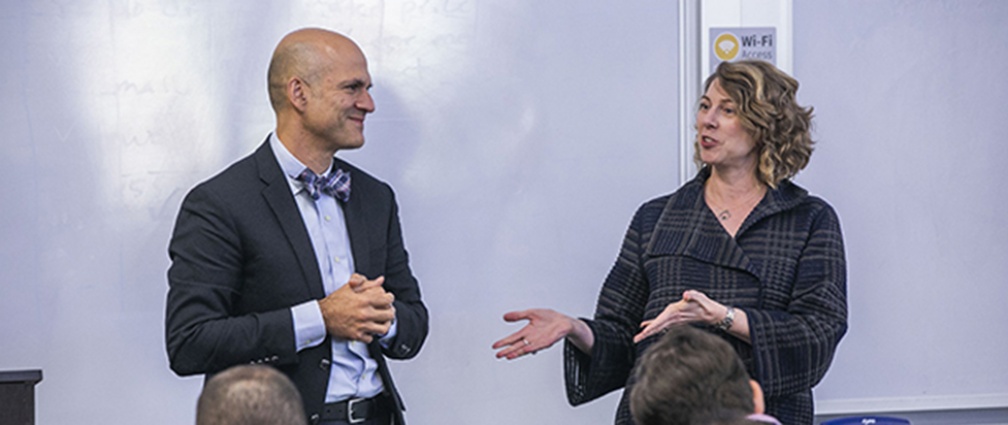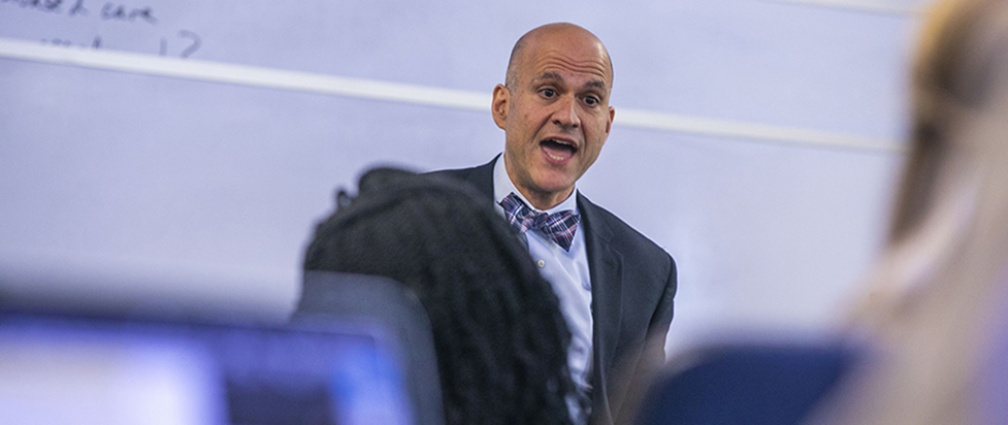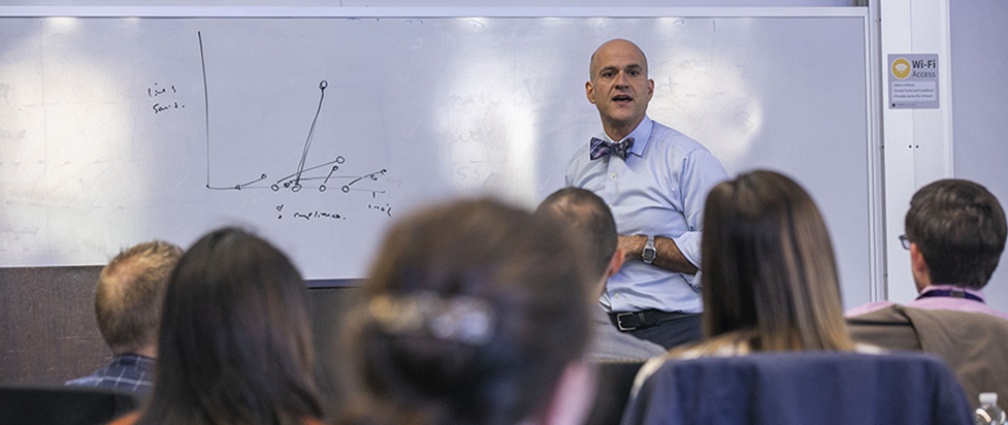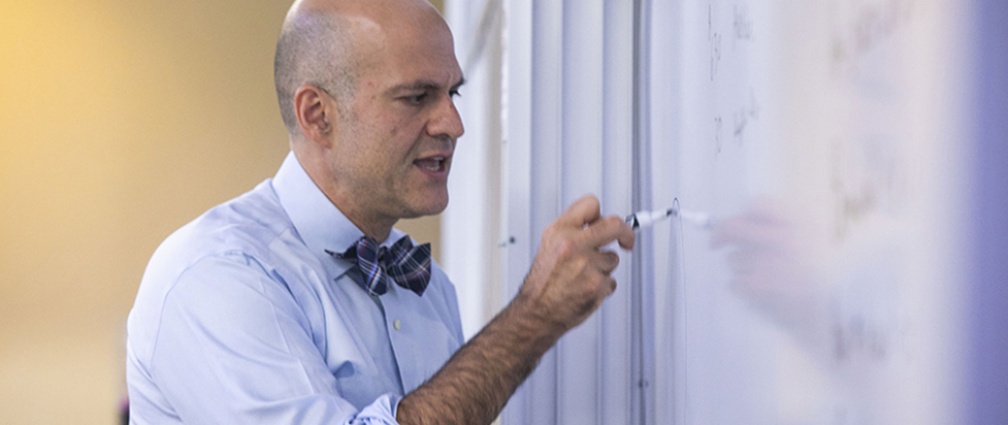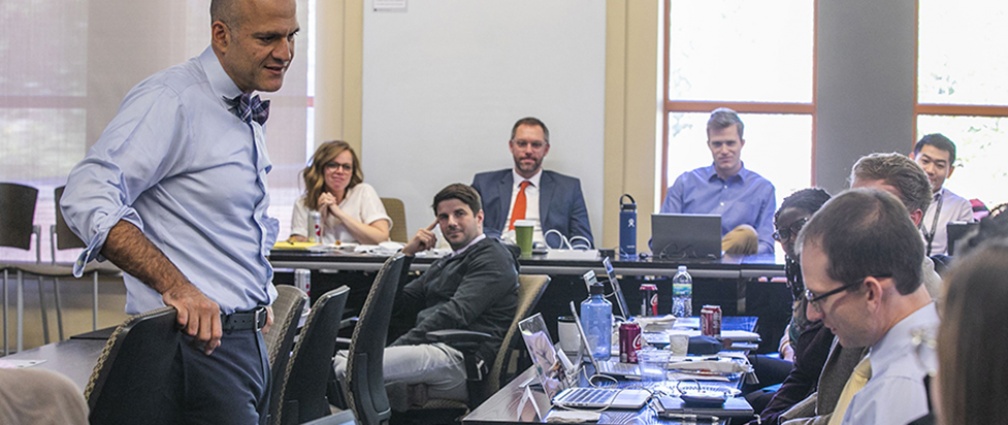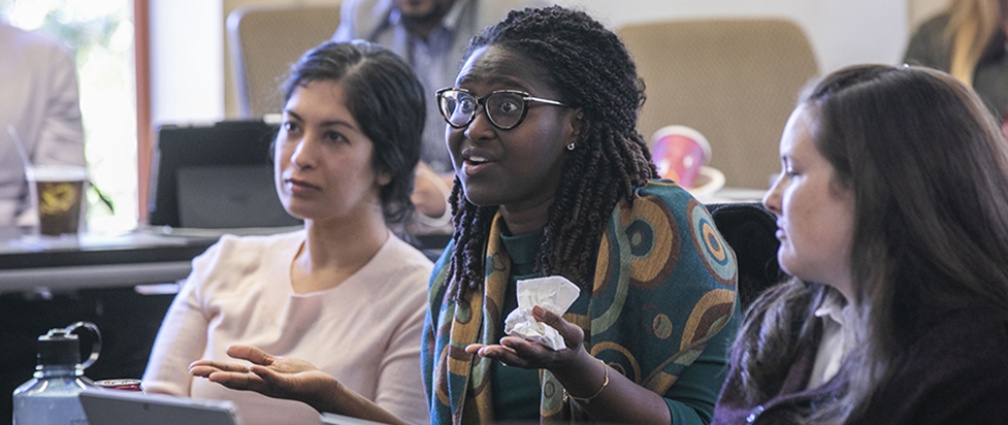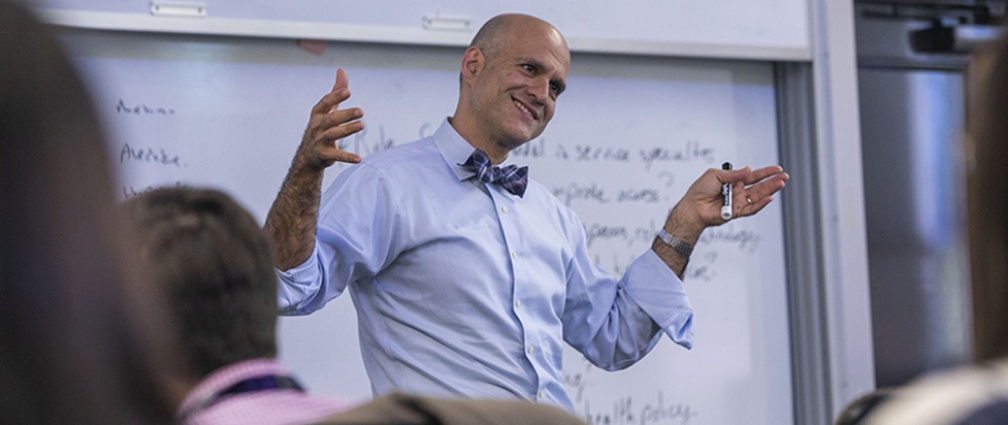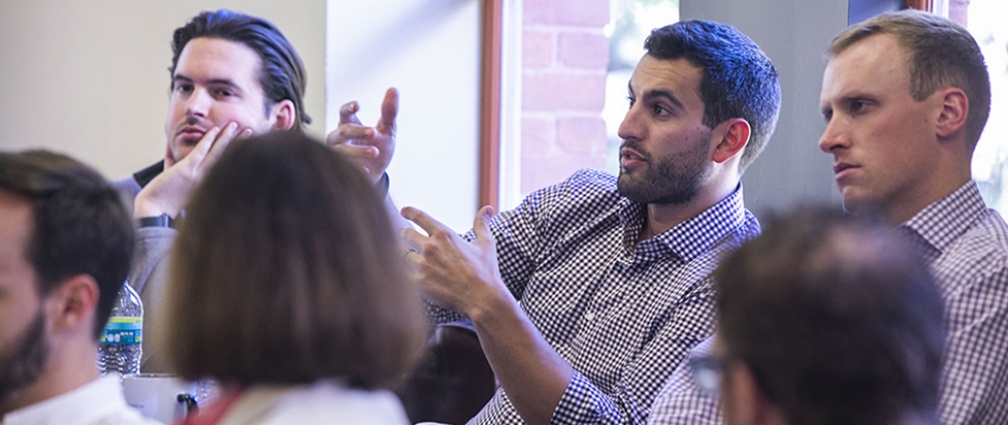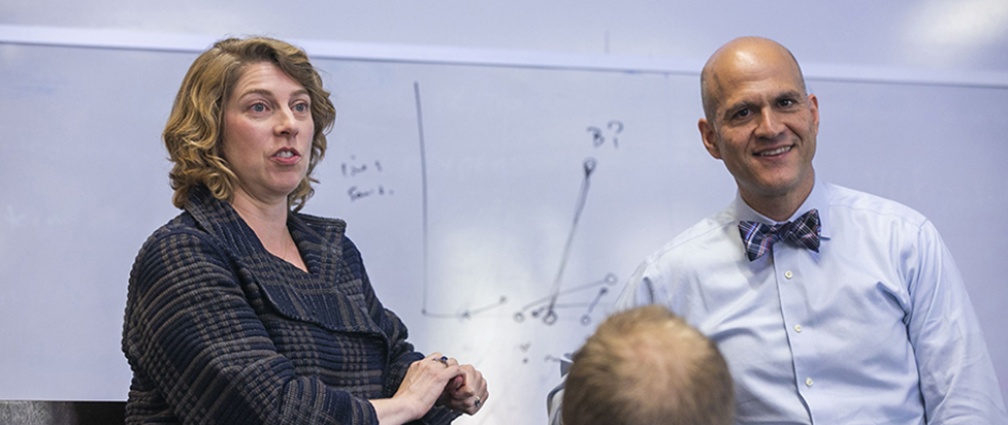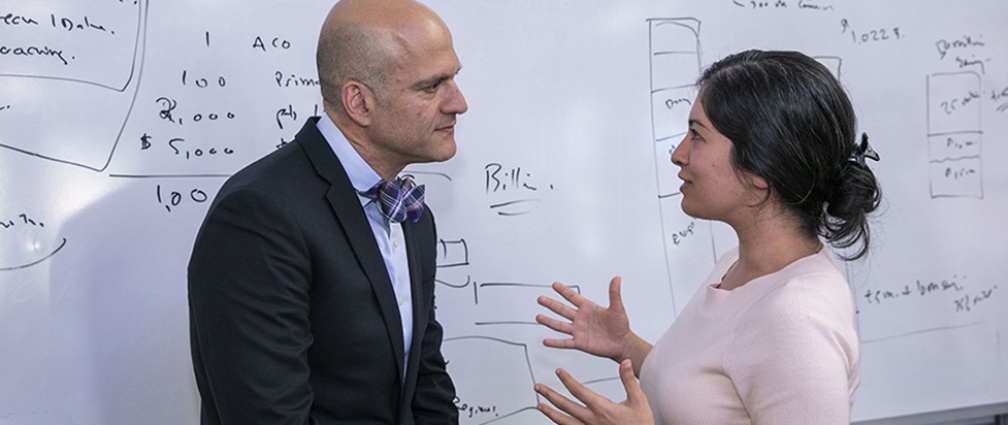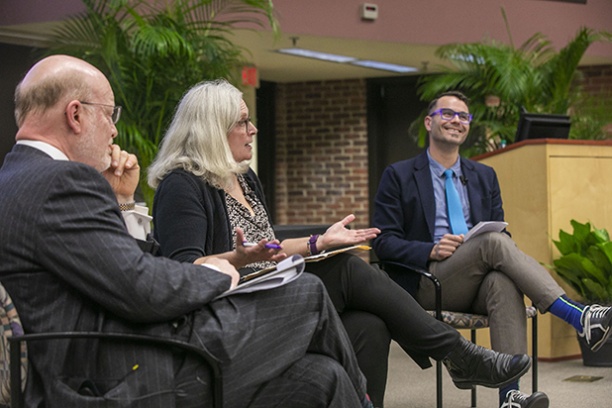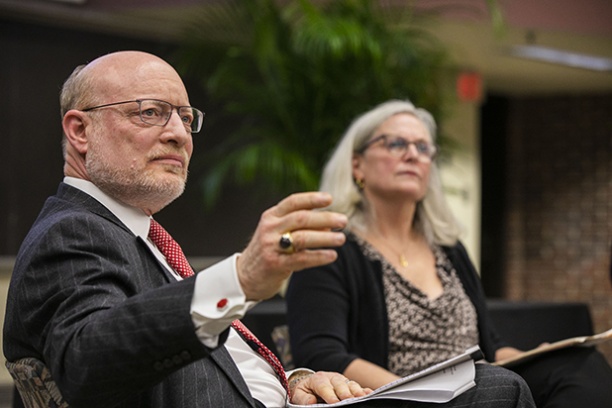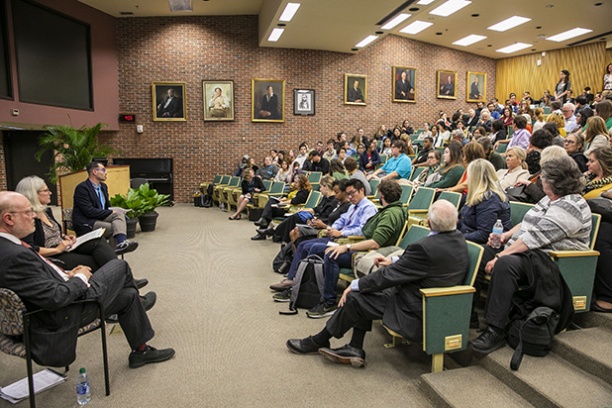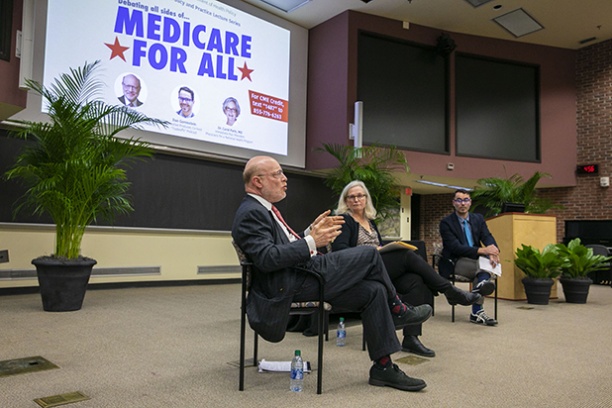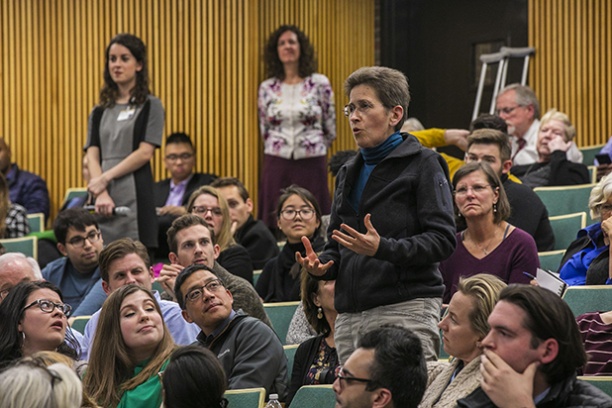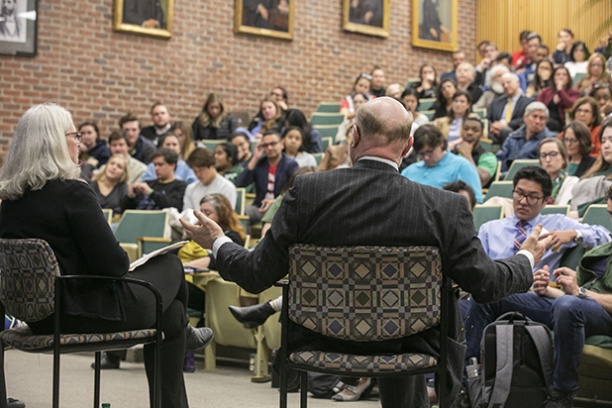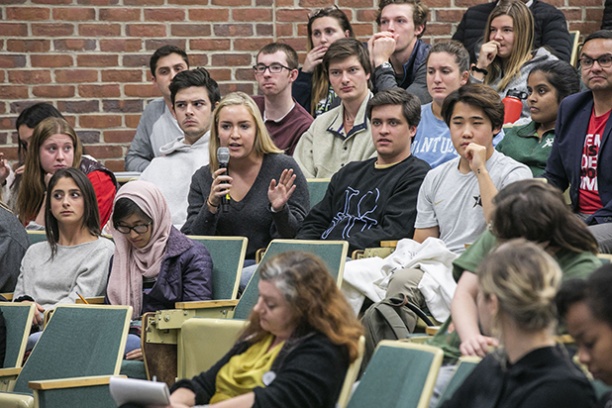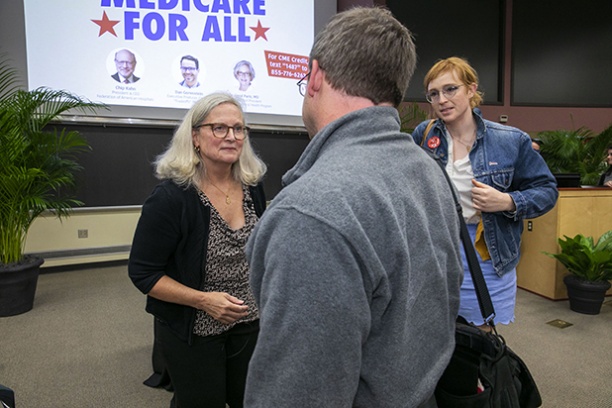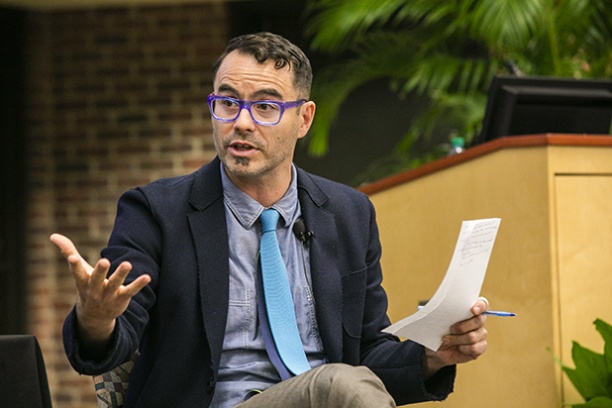2019 Value-Based Health Care Delivery Seminar
Transcript of Keynote Presentation: The Story of Value-Based Care
Keynote Presenter: Farzad Mostashari, MD, CEO of Aledade, Inc.
The following is a portion of the keynote presentation delivered by Farzad Mostashari, CEO and cofounder of Aledade, Inc. Dr. Mostashari's presentation was delivered during the 2019 Value-Based Health Care Delivery Seminar.
Note to reader: This transcript begins approximately 10 minutes into the presentation, which began with two clinically based anecdotes used to illustrate the concept of value-based care in a practical setting. The anecdotes were adapted from Farzad Mostashari's time as a practicing physician in Boston.
This transcript has been edited, and does not include all occasions of crosstalk or portions that may have been inaudible. Some of those instances have been noted.
Farzad M.: That's not cost. That's revenue, buddy. We need the bed open. Because it's money. And when I'm going through it, I can't see any of this. I'm just going through this and I'm thinking, "Something doesn't make sense here. I don't know what. I don't know why this is happening, but this doesn't make sense."
Anyone had that feeling? Why is this happening? I don't understand why the hospital does things this way. It's so illogical. It's not evidence-based. Right? Well it's based on something, right?
You go through the first 15 years of your training and healthcare is a calling. Healthcare is a profession. There's healthcare ethos. Healthcare's this. What is healthcare not in your training? Decidedly not. What it is not about? You would never talk about it. No med school application ever mentions this. What is healthcare not?
Attendee 2: Money.
Farzad M.: Money. Patient asks me, "How much is this going to cost me?" I'm a resident. What do I say?
Attendee 3: I don't know.
Attendee 2: I have no idea.
Farzad M.: But that's not the important thing. How did I feel when I said to her, "I don't know." Did I feel like an idiot? Did I feel like I was failing her? What was my feeling? What was your feeling when you said, "I don't know?"
Attendee 2: That I didn't know it was part of my job? That I didn't know a huge part of my job.
Farzad M.: That I didn't know a huge part of my... No, that's how I felt. Dumber than that.
Attendee 4: A lot. In my mind, I'm thinking a lot when I say that.
Farzad M.: I was proud. Can you imagine that? Imagine how pathetic that is, but I felt a sense of pride. I don't, I don't. That money stuff? I make medical decisions based on the best medical evidence. I felt a perverse pride in not understanding money. I was going to be a public health person pure as the driven snow. I'm not going to think about the money. Not in the first 15 years of my career and not in the second 15 years of my career.
I'm going to talk about healthcare as a profession and a calling and not as an industry. And you keep doing that and you'll keep pounding your head against the wall and wondering to yourself, why? Why does the system work? Because you're not seeing the water you're swimming in. That makes sense?
There's two fish. We're swimming in the water. One fine cool morning, a frog jumps in. "Morning boys! How's the water?" The fish are like (shrugs). If they had shoulders they'd shrug. They don't have shoulders. They just swim by. One goes to the other, "Hey Charlie, what's water?" The frog sees both worlds. Frogs are weird. Be a frog. Right?
The fish are so a part of that system, they can't understand that there's even anything in there. And the water they swim in, are the financial incentives of our healthcare system and unless you understand that, none of what you're going through is going to make sense.
What are the financial incentives of the system? So let's do a case study. We'll take an 80 year old woman, let's call her "Mom" and, past medical history? Significant for a knee replacement. Complications of knee replacement, cardiomyopathy, mild. Congestive heart failure, well managed, small dose of Lasix, she doesn't take much else. She isn't feeling very well, just kind of punky, calls the primary care practice. What happens? Wants to be seen, "I'm not feeling well today." What happens today? Community PCP. She's calling in. "I'd like to be seen." What happens?
Attendee 4: Go to the ED. Go to the ED.
Farzad M.: Well the first thing is, first question is, what time of day does she call? Because if she calls between noon and 1:30 no one's going to pick up the phone, right? That is true. And then sometimes you'd use a message to try but you’re not going to hear back. Why? You got to ask that question. Why? It's a patient [inaudible 00:05:58]access. Access is very important. Why doesn't the primary care office want to see that 80 year old woman walk in with an acute complaint that day. Why?
Attendee 2: Disrupts workflow?
Farzad M.: Disrupts the workflow, right? It's a pain in the ass. I got my schedule. So what if she goes to the ER. In fact, let's have the answering machine say go to the ER. Right? Does it make sense? Okay, let's take the next step. She goes to the ER.
The ER doesn't know her. Doesn't know her history. They measure her blood pressure. Her blood pressure's a little low, right? She actually runs low, right? Remember that? Cardiomyopathy. She actually runs low. But what are they thinking of? What are they... On the charts, they're all saying... Actually, the system is programmed to say what, sir?
Sir. Sirs. Sepsis. Sepsis.
Does she have any signs of systemic inflammatory response syndrome? She's 80, her blood pressure's a little low. She's breathing a little fast. You just took the blood from her, right? So I won! Why does the emergency room care so much to diagnose sepsis?
What? What? What's that to do with money? If you want to deliver the best care possible, early detection of sepsis saves lives! We've seen a raise in mortality from sepsis plummet! Right? Why?
Attendee 3: The government pays for that.
Farzad M.: How much? How much is that hospitalization going to be paid for if it's a UTI? What's the DRG payment for a UTI? I don't know. I just swim in the water. Five K. That's what you get. What's the DRG payment for sepsis?
Attendee 3: 20K.
Farzad M.: 11K. It's Medicare. So [inaudible] will go around trying to identify sepsis and then there's a quality measure that says, "If you've got enough sepsis, we've got you!" More fluids, more antibiotics. "I've got it." What happens to her? So there we've created a problem because there's a quality measure associated with that, because we're trying to do the right things, but we've got to measure the right things. You can't move what you can't measure. We must measure adherence and we will dock your pay two years from now 0.3%. That's a joke. But, it's not a joke because that's our pay for performance value based program here means two years later you'll get docked 0.3% based on remunerative of [inaudible 00:08:52] exclusions compared to the index of where you lie on 30 different quality measures, that's family-based care?
No. That's not family care.
Then she gets admitted and then what does the system want to do to her? She's now admitted. Success! We will get the DRG payment. What does this hospital want to do right now?
Attendee 3: Get her out as soon as possible.
Farzad M.: Get her out. Why?
Attendee 3: Because it's a bundled payment.
Farzad M.: You're getting one payment. You're getting that 11 grand no matter how, right? Back in the old days, how long did you stay for a heart attack?
Attendee 3: Two weeks.
Farzad M.: A month. Take a vacation. Why you're paid by the day. Now how are we paid? One bundle. Now, what is the incentive of the system? "Get them out. I don't care where, just get them out." So they ship her off to the skilled nursing facility and the family goes of this person we'll call "Mom" goes to the skilled nursing facility and says, "When is Mom going to be discharged, because the other people seemed really keen on just getting her out. When are you going to get her out?" And what does the skilled nursing facility say? Anyone worked in a SNF?
Farzad M.: What does the SNF say when the family, on day one says, "What is the plan for Mom's discharge?
Attendee 3: Wait and see.
Farzad M.: Let's wait. Why? Why?
Attendee 3: Count how many days to go.
Farzad M.: How many days you got left? And what is the average, what's the median length of stay for skilled nursing facilities?
Attendee 2: Two weeks?
Farzad M.: Oh no. Two weeks? That's Medicare Advantage territory.
Attendee 4: 21 days.
Farzad M.: 21 days. That's so specific. How is that possible that it's 21 across America? You take the median across all of America. That's 21 days. Why?
Attendee 4: That's what they pay for.
Farzad M.: Because they'll pay for 20 days. After that, the patient has to start paying? Patient doesn't want to pay $165 a night. So on the Monday, which is the Friday which Day 20 is, you get a call from your mom who's confused and says, "They told me I'm leaving on Friday." I'm like, "What?" Like yeah. I was like, "But plan, discharge, criteria, can you walk, can you eat?" "You're leaving. You're leaving on Friday." Okay, 20 days.
That's why the SNF length of stay is 20 days. See how it all begins, comes clear once you understand the underlying financial payment models. Let's keep going.
From SNF she goes home. Actually no. They have upped her dose of the diuretic, because SNF doesn't know what her usual dose is so she gets too dry. They don't know her dry weight. She gets a little dizzy, gets a little confused. What's the SNF going to do?
Attendee 3: Readmit.
Farzad M.: Send her back because, hey, worst case, she gets readmitted, comes back to me. Ding, ding, ding, another 20 days! She goes back to the hospital. The hospital's like, "Wait a minute. Wait a minute, I remember her. We just discharged her. Less than, now let's see, 30 days ago..." Why does that matter?
Attendee 4: Because in 30 days-
Farzad M.: "There's a readmission penalty if it's within 30 days, so we're not going to admit her. We're just going to keep her overnight. We'll call it "Ob Stay" and we're just going to get her home. You know, before she was in the SNF. Now, she came one night ob stay. Family, we're sending her home." "What? Home?" "With home health." Home health agency comes in. "Actually," the family's like, "you know what, we're doing fine here." "No, no. We need to visit you two more times." Why? Why does the home health agency need to visit her at least five episodes? Because then they'll get paid a bundled payment of $3,000 for a 60 day episode.
Farzad M.: I did not know any of this. I didn't know any of it. I was in healthcare for literally 30 years. I didn't know any of this. As I said, I was kind of dumb because I had gone after this to the New York City Health Department. Health Department, woo hoo! Public health!
I was there and this guy Bloomberg was mayor and this guy Frieden is commissioner of health and Bloomberg asks Frieden this question. It's all about what's the question, right? Life is all about, what's the question? And Bloomberg says to Frieden this question that changed my life. "If you're the mayor of the city, say you're the mayor of Nashville and you have a head of public health or you're governor of Tennessee and you have a head of public health and you want to ask them a question, what's the question you want to ask? What's the most single most important question you want to ask that person?
Attendee 4: How can we save money?
Farzad M.: How can we save money? That's your finance director's job.
Attendee 3: What's the most pressing health issue affecting our population?
Farzad M.: Make the question better. You're on the right track, but make it more specific. More action-worthy. It leads more directly to action.
Attendee 3: What steps do we need to take to improve?
Farzad M.: To what?
Attendee 3: Improve.
Farzad M.: Improve. That's a kind of state. Improve. What steps we need to take to what? What's your job? Commissioner of Health in this city, what's your job? Or state.
Attendee 3: Decrease mortality?
Farzad M.: Decrease mortality.
Attendee 3: Yeah.
Farzad M.: Yeah. How do we save the most lives? Now you would think that's like a basic question everyone knows the answer to. How do we save the most lives, right? So I will ask you, health care professionals, how would we save the most lives? You're in New York City. It's 2002. How do you save the most lives? For a city, what, based on your public health powers, public health people? Help me out here.
Attendee 3: Prevention?
Farzad M.: Prevention. Like what, specifically? How do you save the most lives?
Attendee 2: Trauma, MVCs.
Farzad M.: Motor vehicle.
Attendee 3: Truck crashes.
Attendee 4: Trauma.
Attendee 3: Smoking, it's smoking.
Farzad M.: It's smoking.
Attendee 3: It's smoking.
Farzad M.: It's smoking. So we raise the cigarette tax 42 cents, they've raised it about 42, you ban smoking in bars and restaurants, we enforced teen smoking rates. In four years, teen smoking dropped from 14 to 7%. In New York City, the gap between rich and poor on mortality is the smallest of any city in America.
And the decline in smoking rates went from 22% to 17% for five years because we focused like a laser beam. We didn't say, "What is it that we do now? We have a TB clinic. We have an STD clinic. We have communicable diseases. We have divisions for things that killed people a hundred years ago. That's the structure of the health department. We catch dogs. We put nurses in schools, right? We just keep doing that. We have a budget. We're going to try to keep our budget," but if you ask the question, what do we do to save the most lives, then it becomes clear that you've got to create and divert as much of your funding as you can into a tobacco control program.
It is shocking how few institutions think that way, guys. Right? You're going to be part of an institution, where by [inaudible 00:17:10] you're not going to ask the question. I guarantee it. You're not going to ask the question. Your board’s are not going to ask the question. You're not going to act that way. You're not going to change your resources to answer the question. You're going to keep doing what you're doing. That's institutional inertia and it takes incredible force of will to ask the question and then follow through on what the implications of that question are, all the way through.
That's what we did. We saved a lot of lives. And then we said, "Huh, there's this paper by Beth McGlynn that says that for the things that health care can do, those USPSTF AB recommendations, we follow them, we as in health care, we follow them about..." How often?
Attendee 3: 60%?
Farzad M.: When we're good. 50%. That was the McGlynn article, right? That article also changed my mind. Because it was like, wait a minute. The things that would save the most lives from healthcare, we do have to... Actually she didn't say that. She said, "Of all this long list of USPSTF AB recommendations we do them about half the time." And then the question was, "If you're going to focus, if you're going to focus healthcare on one thing, and you're going to say, we're going to draw the graph, and on that graph we're going to say, where are we today, percent compliance?" 100%? Where are we today? 40%? 50%? right? And if we were to achieve the rate that the best performing health systems we know, is possible, how many lives would we save?
So if you take this thing and you just shifted this amount, you would say this number of lives. The slope of the curve essentially tells you the amount of effort you can do, on an initiative.
Right? This graph. I'm looking for this graph. What can health care do to save the most lives? That's the question. This graph is the answer. What's this?
Wait a minute. I thought this is the healthcare people. Aren't you guys healthcare people? Don't you know what should healthcare do to save the most lives? Sorry, am I in the wrong class?
What should healthcare do to save the most lives?
Attendee 2: Prevention?
Farzad M.: What? What specifically? There's a whole list of USPSTF-type stuff. Prevention of what?
Attendee 2: No smoking, obesity, diabetes...
Farzad M.: Obesity? Do we know what to do about obesity, sir?
Attendee 2: No...
Farzad M.: Is there a prescription you can write? Cause if there ain't a prescription you can write you don't know anything about it. I got to go fix it. Does that sound like your system? "Write prescriptions."
Farzad M.: Come on hoofs, you're almost there. How do we save the most lives?
Attendee 4: Cancer screening.
Farzad M.: Cancer screening. Ooh, we can get up to 100%. Some of them got Kaiser. Man, they're good at it and the total number of lives saved on that, not that impressive.
Attendee 3: Alcohol? Alcohol... No?
Farzad M.: No, no, no, no. Doesn't show up that much. And it's really low now.
Attendee 2: Vaccination?
Farzad M.: Vaccination will be low. We're not talking public health immunization right? We're talking about where we are today. We've already got pretty good herd immunity and all that kind of stuff.
Is this... Who are these people?! What have you been taught? You haven't been taught how you can save the most lives in healthcare? The board doesn't meet...
The board of your institutions doesn't meet quarterly and discuss progress towards the single thing they could do to save the most lives. Why not? Do they discuss their — what — financials?
The length of stay. The hospital CEO knows length of stay to two freaking decimal points and you can't tell me this? Clearly the healthcare system is not about saving lives. The healthcare system (inaudible) . She's like, "I'm going to get this. I'm going to get this." What kills the most people? Heart disease? What is the single thing we can write a prescription for that will reduce heart disease the most?
Attendee 3: Oh, statins.
Farzad M.: Statins is number two.
Attendee 3: Oh, blood pressure.
Farzad M.: Blood press... Oh. Boring. Blood pressure boring. All right, when was the last time a new drug came on market for blood pressure? Never because we don't need one because we have you know, Chlorthalidone, that works.
All right, isn't that weird? Not weird? We could the most lives could save is on blood pressure control and we don't. We're, we controlled like 55% of the time.
So, I'm like, I'm going to solve this problem because I understand what the problem is and why we can't improve blood pressure control and what back-assward idea that I have for fixing it. Clearly this is the problem of … financials. No, I'm still in my, phase of and what is this a problem of? Technocratic. You can get in technocratic and fix this. Hmm? You can't measure, remember? You can't move what you can't measure. You walk into the average doctor's office and you ask them, "What is your blood pressure control rate?" They're like, "I don't know." All right?
So clearly there's an information problem and we're going to roll out electronic health records to every doctor in America so that we can solve this problem. Literally, that meaningful use stuff that you guys are like, Oh neat. We use the government. I hate the government. It was all about this. I was saving those lives, blood pressure control. You have require those. Like Edwin, my co founder was it these EHR companies, and he's like, "Back in the good old days, doctors bought computers to solve the problems they had." Feeling.
Farzad M.: And then the government came along and said, "You have to measure blood... record blood pressure, exactly this way, and you have to record medications according to one system. Who cares? One system, two systems, twelve systems and you got to record diagnoses and you got to be able to do decision support around that and you have to give the report quality measures. You know, you list maybe a dynamic registry of patients, with high blood pressure."
What a pain in the ass. Any what attorneys with total yet, you know what it didn't do?
Attendee 2: Fix rates of blood pressure.
Farzad M.: Doesn't that suck? You spend $30 billion. You're like, "We won. We got to know what's wrong with blood pressure to do this." And it didn't do this and it didn't do this because you get paid when they have the stroke. You don't get paid to prevent the stroke. So what's, what's a technocrat to do in that situation? You start a company. And the company was based on this math. There's this thing called an accountable care organization. Heard about it? Value-based seminar and that was at Brookings and I wrote this on the board, and I was like not sure if this makes sense.
You get one ACO, you get a hundred primary care providers in a room kind of like this. Each primary care provider has how many patients on their panel?
Attendee 2: 2000?
Farzad M.: 2000 patients per PCP. The medical, total medical spend per patient per year. Total medical spend in America for an ambulatory primary care population is... average?
Attendee 3: $5,000?
Farzad M.: Jesus Christ. Do you want a job? Okay, who's good at math? You sir!
Attendee 5: Me?
Farzad M.: You!
Attendee 5: Am I multiplying all these numbers?
Farzad M.: Yeah. A hundred PCPs, each one has 2000 patients. Each patient is $5,000 multiply. How many? How many dollars is that sir?
Attendee 5: 10 million?
Farzad M.: 10 million. You, sir.
Attendee 2: That times a hundred?
Farzad M.: That times a hundred. So you're telling me that I should do two times five is 10 and then add a zero, zero, zero, zero, zero, zero, zero, zero. Is that what you're telling me? That this is a billion dollars? Is that what you're telling me?
Attendee 2: Yes sir.
Farzad M.: Is that...? That can't be right. That's not right. 100 times there that's a billion? That doesn't make sense. How big is Vanderbilt Medical Center's annual budget?
Attendee 3: 5 billion.
Farzad M.: 5 billion? It's a lot more than a hundred primary care docs. Is that right?
Attendee 2: $200,000?
Farzad M.: She's got a calculator on her. It's $1 billion. It's $1 billion industry. So you take that billion and we actually did this. We actually did this. We started a bunch of groups of primary care docs in 2016. We went around the country. We went to five States. We scraped together and the insurance company said, we're expecting, insurance company including Medicare, to spend $1.06 billion, yeah, on these 100,000 Medicare patients. It doesn't matter. We're expecting to spend $1.076 billion. Now about this billion dollars. How much of this goes into hospitals, hospitals inpatient/outpatient, and so forth?
Attendee 2: 30%?
Farzad M.: 30% is hospitalizations and you're counting the hospital outpatient department about, oh, close to half by the time you're done is the hospital. And then you got your post acute and you've got your drugs and you got your... And then you're good. Then you got down here, you've got your primary care. Yes, primary care! Woo hoo! How much do we spend on primary care? What percent of all dollars we spend is primary care dollars?
Attendee 2: I think like 5%?
Farzad M.: 5%. Isn't that so sad? Isn't that so sad? Sheesh. So how much of that is, what's 5% of $1.07 billion? Hurry up, Felicia, you need your calculator.
Attendee 3: Fifty million?
Farzad M.: Fifty million. Fifty million for primary care. A hundred and... A billion dollars for the failures in primary care. Okay, so then what did we do? We increased this by 12% and we gave them lists and data and tools and tech and work playbook and we were like, "Do this. Pick up the phone at noon. Have the patient come to you instead of go to the emergency room or that kind of stuff. And what happened to the total cost of care? You'd be shocked or maybe you wouldn't. It went down to 1.02. Huh! It doesn't seem like a big difference, but it was like $50 million of savings. This actually happened folks, this is actually happened. This is 2018. So we've got $50 million of savings and of that fifty million, twenty five million went to the taxpayer for giving us this opportunity to save the nation. 25 million. And then this other 25 million, we split. The docs, got 15 million and we got 10 million.
Farzad M.: So these docs who are getting 50 million total got another 5 million in medical expense and then they got another 10 million in savings. So they got a 35% raise.
Not bad. Over time, we think they're going to double their take home pay and these primary care docs instead of making 200 grand a year are going to make four or 500 grand. They're going to be like urologists. It's going to be awesome. So, so that's the business, Bob. And some of you beforehand said, well how does it, how does this actually work? But what do you actually do for real?
And there's three things that we, that we give to the practices and we don't buy them. So we have these small practices who individually could not create a risk pool that is of sufficient size to be able to do these actuarial estimates on. So you have to have at least 5,000 preferably 10,000 lives in that pool, plus Aledade.
We go to the payer and we say, "Hey, payer." "Hey Medicare, Blue Cross whatever." "You're already paying these guys fee for service. How about if you give us a shared savings contract and if we save money for you then and only then we will split the money with the docs." And in return we give these docs three things. One, we help them with reg contracting, get them, get the contracts to tech and data. That's why Edwin is there, he is saving them from EHRs.
And third we give them coaching because it is hard to see the water you're swimming in. And for a lot of the docs, they're like, I can't squeeze in Mom when she calls in the middle of the day and she needs to be seen. And I say to them, "Could you do it for $600? Could you find a way your heart and in your schedule to squeeze in that patient if it's a $600 offer?" And they're like, "Who's paying? If I can prevent that ER visit, that's $2,000 and I get my share, that's $600 right?" You've got to keep saying that 12 different ways until that clicks in, in terms of what the basic dynamics are, that if you save $100 you actually get to keep 30 dollars. Total like crazy mind blowing. And then what do we actually, the change, cause a lot of people say like, "Oh yeah, you know, these ACO things don't work." Let me ask you. Let me ask. Sure, Ed. Let's call you that. Do you have a wallet? Can you take out your wallet? Take out the cash. Okay.
Farzad M.: We got a rural hospital over here.
Farzad M.: Take out your cash. Yeah. How much you got there?
Attendee 2: $31.
Farzad M.: $31. All right. Give it to Ashley. Ashley, give him back half of it. Promise that you can keep whatever. Yeah, there you go. Right, you happy? You saved $31, you got back 11. You happy?
Attendee 2: Bro.
Farzad M.: Bro? You're not thrilled. That is-
Attendee 2: Give me back my money.
Farzad M.: That is a hospital ACO, never made sense to me. Or you go to hospitals, and you say, "Hey hospital, reduce your hospitalizations, and we'll give you back half of it." Hospitals are like, "Any penalty if I don't?" And you're like, "No. No penalty." Look, sure, sure. Call an ACO. Those ACO's work on average, on average. How many dollars per patient did the average hospital ACO save off of the $10,000 a year? $10,000 Medicare, no, more like 11. How many dollars of that did the average, let me just give you some context. Aledade saves about $630 and we're, we're five years old. We're just getting started. We don't have any hospitals. We don't have any urgent care clinics. We don't have any specialists. We have nothing. All we have is these ragtags for primary care docs and Edwin’s technology. We save about $600. How much does the average hospital ACOC?
Attendee 3: Two fifty.
Farzad M.: Two fifty. Two fifty, two fifty, two fifty, two fifty. Do I hear... How much? In the back?
Attendee 6: 100 bucks.
Farzad M.: 100 bucks.
Attendee 7: 40 bucks.
Farzad M.: 40 bucks.
Attendee 4: 200 bucks.
Farzad M.: 200 bucks. Wisdom of crowds. Eventually we're going to arrive at the right answer. Last year, if you asked the head of the Medicare payment advisory committee, he'd say to a rough approximation, it's... This year, he said ... There's no more digits coming. That's it. All right. Why? Hospitals' incentives are all messed up. You're like reduce hospitalizations but not the ones that we want. Let's not have the bits and EMT. Let's say we're doing value-based care and maybe we will, but as long as it doesn't change our, you know, OR occupancy rate or the proton beam that you just bought or the specialist referrals that we want to get and for God's sake, let's not have any of those... Let's not lose any of those referrals that can come to us we just finance the cost of that independent community practice.
Farzad M.: Let me say that again cause that's kind of weird thing to say. I said, "The cost of something in the health system, let's be you, the cost, is like three to five times the cost of the same thing outside." Why is that? Is that true first of all? Did I say something true?
Attendee 3: The charge is higher.
Farzad M.: The charge is like, 10 times higher, but the actual like dollars paid, for Medicare it's not true. It's more like two and a half, but for commercial we don't have a ton of data on this and my friend Niall who's run this organization called HCCI, I guess it's board members including one Melinda Buntin haven't been to telling him what to do because I keep telling him, give me the data of a commercial, but we have one shred of inside on this, which is the North Carolina Treasurer. There was a nice article in Politico Today that North Carolina about what they’re doing. He said, what if we paid everyone 160% of Medicare, everyone for our state-based lives and what they found was that if you look at how much people are being paid today compared to Medicare for professional services, the low man on the totem pole only gets 65% of Medicare and the high man on the totem pole gets paid 994% Medicare.
Why is this incredible quality proven measures? No, it's because this person had a? This person had a mana... Monopoly! This person had a monopoly. So they were able to go to the payer and say all or nothing contracting, gag clause, no tear no steer, like all this kind of stuff. Like, You must pay me what I asked else, you don't have a plan." That's what's known in the business world as leverage, otherwise known as predatory pricing. So that's what happened, right? You get big and you have a lot of leverage and if you're a hospital ACO, who's getting mucho bucks for your patients coming in here for all the stuff that you get done here, the number one thing you're worried about is, it sounds like a GI condition. What's the name of it?
Attendee 3: Competition.
Farzad M.: Competition sounds like a GI condition? It's called leakage. You don't want your patients to go out of the hospital system.
Farzad M.: How does that do for reducing cost of care? Don't, right? So that is why our idea of focusing on independent primary care practices now seems like a smart idea. But five years ago seemed cuckoo. It was like everyone knows. Peter Thiel says that every start-up knows one thing that everyone else thinks is wrong. And for us, everybody knew that the most powerful institutions in health care are hospitals. Everyone knows that and we knew something different, we knew that it's not possible. It's actually those straggling bedraggled little moraled, small linoleum floored primary care docs who are the most powerful force in a value-based world.
And most of you don't believe me. Because everything in your experience says that the marble is where the power is. And that is true in fee for service world. In fee for service world, the bigger you are, remember monopoly. The bigger you are, the more power you have, the higher price is, the more marble you get to build. The more nonprofits you make. But the value is for all of that armor that you slapped on, right? Becomes a liability.
So there's David versus Goliath out there. What did Goliath have? Anyone know the story?
Attendee 4: A big sword.
Farzad M.: He had a spear, I think? Sword? He says to David, know what he says? He says, "Hey David, come close. Where I can see." Why does Goliath, it's a weird thing to say, "Come close" Why did Goliath say, "Come close where I can see you?" He had...?
(Crosstalk)
Why is he like, he's a giant. He's like, it's as if he's got some sort of pituitary adenoma pressing on his brain, right? So he's this, he actually has a disease. He has this disease. He has a pituitary adenoma that's growing and growing and pumping out hormones, telling him grow, grow, grow, grow, grow. Right?
And now he's all laden down with all this armor because that's how you won the old war where you would go up to someone and chop at him and he's big and he's got all this armor and he can't even see in it. Right? And David, David's gone and picked up that pebble and he's staying far away, and he's reducing hospitalizations by 15%. So, that's the story of value-based care. Thank you.
